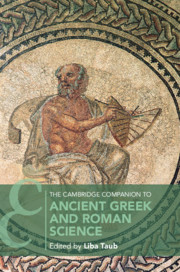Book contents
- The Cambridge Companion to Ancient Greek and Roman Science
- Other Volumes in the Series of Cambridge Companions
- The Cambridge Companion to Ancient Greek and Roman Science
- Copyright page
- Contents
- Contributors
- Acknowledgements
- Introduction
- 1 Presocratic Natural Philosophy
- 2 Reason, Experience, and Art: The Gorgias and On Ancient Medicine
- 3 Towards a Science of Life: The Cosmological Method, Teleology, and Living Things
- 4 Aristotle on the Matter for Birth, Life, and the Elements
- 5 From Craft to Nature: The Emergence of Natural Teleology
- 6 Creationism in Antiquity
- 7 What’s a Plant?
- 8 Meteorology
- 9 Ancient Greek Mathematics
- 10 Astronomy in Its Contexts
- 11 Ancient Greek Mechanics and the Mechanical Hypothesis
- 12 Measuring Musical Beauty: Instruments, Reason, and Perception in Ancient Harmonics
- 13 Ancient Greek Historiography of Science
- Bibliography
- Index Locorum
- General Index
- Other Volumes in the Series of Cambridge Companions (continued from page ii)
10 - Astronomy in Its Contexts
Published online by Cambridge University Press: 17 January 2020
- The Cambridge Companion to Ancient Greek and Roman Science
- Other Volumes in the Series of Cambridge Companions
- The Cambridge Companion to Ancient Greek and Roman Science
- Copyright page
- Contents
- Contributors
- Acknowledgements
- Introduction
- 1 Presocratic Natural Philosophy
- 2 Reason, Experience, and Art: The Gorgias and On Ancient Medicine
- 3 Towards a Science of Life: The Cosmological Method, Teleology, and Living Things
- 4 Aristotle on the Matter for Birth, Life, and the Elements
- 5 From Craft to Nature: The Emergence of Natural Teleology
- 6 Creationism in Antiquity
- 7 What’s a Plant?
- 8 Meteorology
- 9 Ancient Greek Mathematics
- 10 Astronomy in Its Contexts
- 11 Ancient Greek Mechanics and the Mechanical Hypothesis
- 12 Measuring Musical Beauty: Instruments, Reason, and Perception in Ancient Harmonics
- 13 Ancient Greek Historiography of Science
- Bibliography
- Index Locorum
- General Index
- Other Volumes in the Series of Cambridge Companions (continued from page ii)
Summary
Astronomy has often been called the oldest science, and some ancient Greek authors acknowledged a debt to Babylonian predecessors. Many of the earliest Greek philosophers are credited with astronomical observations, predictions, explanations, and discoveries. Yet, throughout much of Greco-Roman antiquity – and later – astronomy was regarded as a branch of mathematics, along with arithmetic, geometry, and harmonics. This view of astronomy – as a branch of mathematics – raises questions about what constituted astronomy, as well as its relationship to philosophy.
- Type
- Chapter
- Information
- The Cambridge Companion to Ancient Greek and Roman Science , pp. 208 - 228Publisher: Cambridge University PressPrint publication year: 2020
- 2
- Cited by

